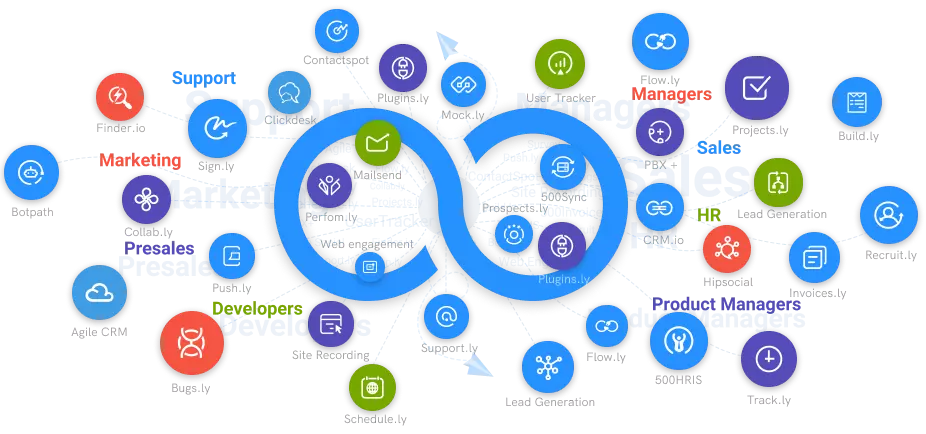How Is Lead Management Software Important for Your Sales?
Lead management system helps you to drive your prospects effortlessly from the initial brand awareness phase to the ultimate sales closure phase
#1
Generate SQLs through LinkedIn Bot, dialer, 730M built-in leads database and email finder
#2
Build a perfect sales outreach cadence to engage leads
#3
All-in-One Sales Suite
#4
Social Media Bot Crawler
#5
Built-in Workflows
#6
Real-time Automated Reminders
#7
Robust Action Planner
#8
Smart Prospect Engagement
#9
Unbelievable pricing - the lowest you will ever find
#10
Everything your business needs - 50 apps, 24/5 support and 99.95% uptime
Prospects, buyers, potential customers, and opportunities are just some of the names for sales leads (qualified opportunity, sales-ready opportunity, marketing qualified opportunity). Advertising, marketing activities, trade exhibitions, snail mail, cold emails, cold calls, and other "outbound" approaches can all be used to generate leads.Getting leads and expanding your sales and marketing pipeline is one thing; managing those leads is a whole different ball game. But with lead management, why is lead selling software important?
What Exactly Is Lead Management, And Why Is It So Crucial?
Managing leads and ensuring they receive the attention they require, with the ultimate goal of converting them from "lead" to "customer," is known as lead management tool.
Lead management is critical for any company that sells to other companies (often known as "business to business" or "B2B" for short). And as your business expands, so will your lead funnel, frequently at a faster rate than your sales force can handle. Fast growth means leads won't get the attention they deserve, resulting in "lost leads" and missed opportunities to close new business.
You may reduce the chance of losing deals by implementing good lead management software and procedure. All lead information is displayed with a good lead management solution. Communication is maintained and managed. Your sales team can discern "hot leads" from "cold leads," resulting in higher conversion rates.
Lead Management in 5 Steps
While every company's sales team is operated differently, most of them will incorporate these five processes in their sales and marketing lead management.
Step One: Generation of Leads
Traffic transforms into revenue when a good, scalable lead generation process is in place. To attract and engage new consumers, sales and marketing teams employ various strategies (both outbound and inbound). The idea is to pique their attention and get them to transition from "simply looking" to "tell me more." Any organization's top priority is to increase (quality) sales leads. In fact, according to one recent report, "generating sales leads" was a top concern for more than half of organizations now.
Step Two: Capture The Lead
This information must be recorded when a prospect interacts—clicks a link, downloads a marketing asset, fills out a form, replies to an email, phones your organization, or answers an outbound call (and doesn't conclude the discussion with "no thanks.") The buyer's status changes from "anonymous" to "official." The more demographic, firmographic, psychographic, geographic, and other data you can collect, the better. These details enable improved lead segmentation and targeting.
Step Three: Direct Categorization
When it comes to segmenting and targeting leads, categorizing leads—sorting them by legitimacy and importance—aids in determining the most efficient and successful follow-up methods.
There are numerous methods for categorizing leads, and there is no "correct" or "wrong" approach. There are several methods for sorting leads: - By source: in-person vs. online (event, tradeshow, etc.) - Outbound vs. incoming traffic - By preference: requested a demo vs. clicked on an email link - By "temperature," we mean cold, warm, and hot. - Size of business/employees: SMB vs. enterprise
The categories (and sub-categories) can (and should) change as leads progress down the funnel.
Step Four: Following The Lead and Nurturing It
When a lead has been captured and initially categorized and qualified, as indicated in step #3, it's time to follow up leads. A phone call, an email (one-off or automated), a knock on their office door (we don't advocate this!), or whichever method of contact you use, leads must be monitored and nurtured to become clients. A lead nurturing strategy will assist prospects in moving through the sales funnel and becoming paying clients. Personalization and segmentation are critical. In fact, according to a recent study, segmenting marketing materials raises the average email open rate from 18% to 28% (compared to non-personalized content). Be sure you send communications based on how qualified each lead is and which stage of the funnel they are in. Use this process to generate sales qualifed leads in bulk.
Step Five: Lead Conversion
Converting a lead into a customer or shifting them to the "closed-lost" stage is the fifth and last step in the lead management process (the former preferred over the latter, of course). Like any other marketing approach, lead generation is an ongoing activity that must be examined and improved. Remember to keep the bottom of your lead-generating funnel in mind as you test and edit. It's pointless to obtain a visitor who doesn't become a lead, and it's pointless to get a lead who doesn't convert.
Conclusion
To complete the above five stages, you'll need more than a pen and paper. And depending on the size of your sales and marketing staff, you'll probably need more than just a spreadsheet program. An effective lead management software or sales engagement platform can significantly positively impact conversion rates.
Use Outreachly's sales engagement platform to engage and convert prospects into leads. Get more out of Outreachly today!





